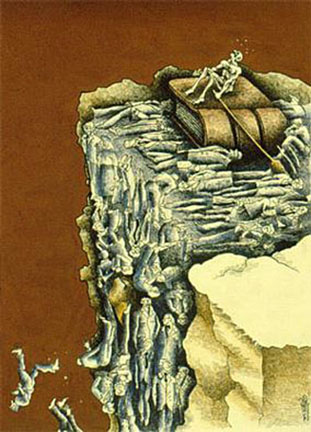Advice from China to Iran: 'Back Away From the Cliff's Edge'
Will Iran 'back away from the cliff's edge' in its confrontation with the United States? This op-ed article from China's State-controlled Beijing News warns Iran that so far, it's gamble with the U.S. over its nuclear program may have worked, but, 'In the long run, actions taken by a weak country that merely looks strong are not always going to work.'
By Wen-Lin Tian*
Translated By Mark Klingman
April 23, 2006
China -Beijing News - Original Article (Chinese) 
 Iranian President Mahmoud Ahmadinejad: Beijing
Iranian President Mahmoud Ahmadinejad: Beijing
Warns He's 'Cruising for a Bruising.' (above)
 [ NEWS PHOTOS: Iran].
[ NEWS PHOTOS: Iran].

 Using the Most Up to Date Safety Procedures
Using the Most Up to Date Safety Procedures
and Equipment [NOT!], Workers in Iran Refine
Zirconium, a Key Element for Enriching Uranium.
------------------------------------------------------
Recently,
the Iranian nuclear crisis has once again become a media focal point. After
April 11 when Iran announced the explosive news that it was now enriching
uranium, the international community flew into an uproar. The United States particularly,
was on pins and needles. "How to manage Iran" has become an urgent
and all-too-real question for American policymakers.
U.S.A Today disclosed that the U.S. plans to hold
tactical maneuvers this July, in order to allow officials at all levels to thoroughly
consider possible responses to the Iranian nuclear crisis. It seems as though this
is not just a case of crying wolf.
Whether or
not the United States uses the option to attack depends mainly on the degree of
urgency inherent in Iran's nuclear plan (whether or not they can seriously approach
making a nuclear weapon), as well as the emerging trend of Iranian nuclear
policy. At present, although Iran is only using low-enrichment uranium, it has basically
overcome the technical hurdles of nuclear development - though, strictly
speaking, Iran is far from manufacturing a viable weapon and is thus not yet a
member of the "nuclear club."
According
to the IAEA [International Atomic Energy Agency] definition, the level of
uranium enrichment that the Iranians have reached still doesn't go beyond the experimental
stage. Experts also believe that if it uses only the equipment it currently
possesses, Iran will take at least 10 years to produce enough weapons-grade
enriched uranium to produce a nuclear bomb. In light of this, Iran's nuclear
breakthrough is a very gradual one, with has much more symbolic than practical significance.
Therefore,
as to the question of whether the U.S. will use force to arrest Iran's nuclear
plans the key certainly doesn't lie in whether it tolerates Iran's
"nuclear manifesto," but rather, whether Washington will "quest
for Sichuan even after conquering Gansu," - that is, whether the U.S. will
relentlessly carry its hard-edged anti-nuclear policy to the bitter end. Iran,
for its part, has had its share of diplomatic successes, but it is playing a
dangerous game of chess - or rather, Iran is like a young child playing with
matches.
Compared
to the muscularity of the U.S., Iran is a weak and tiny country. Nevertheless
Iran currently holds several trump cards that it may use (for example, the
petroleum card, the Iraq card, the geopolitics card, and so on). Iran is
showing a strong and proud spirit to proceed with its nuclear ambitions, and has
forced the America into this frightful gamble.
At the
same time, however, Iranian nuclear policy seems to be nearing the edge of a
kind of cliff. Iran has a time-tested method of courting danger that up to now,
has worked. But this doesn't change the fact that it might at any moment find
itself falling into confrontation.
In
particular, as the sensitive question of its uranium enrichment develops, the
risk of war that Iran faces grows greater and greater. In the long run, actions
taken by a weak country that merely looks strong are not always going to work.
After all,
what we are witnessing is not only a contest of national will, but of national
strength. The U.S., as the world's sole superpower, has followed its own global
strategy since the end of World War II - and with few exceptions, it has never flinched
when a strategic benefit was at stake.
 Will Iran Pull Back from the Precipice?
Will Iran Pull Back from the Precipice?
-------------------------------------------------------
Since Iran's
Ahmadinejad took office last August, he has obviously wanted to appear as a
great challenger to the established order. Take for example, his frequently-expressed
candid opinions that question Israel's right to exist in the Middle East; or his
refusal to yield to Western pressure on the nuclear question; or his acting as
the anti-American standard bearer of the Islamic Middle East.
America
sees its interests in the Middle East as the fight against terrorism; seeking
nuclear non-proliferation; ensuring the safety of Israel; and preventing a major
regional power from arising. Iran's get-tough policy threatens American interests.
Looked at within the context of America's new focus on national security, Iran can
only be regarded as the biggest single threat to those interests.
The
correct road is to "alternate tension and relaxation, and alternate civilian
and military affairs." Perhaps Iran will adjust its rigid policy - only then will
they be able to back away from the cliff's edge.
* Wen-Lin Tian is a member of the Modern Chinese International Relations Research Institute for Asia and
Africa
Chinese Version Below
伊朗外交站在悬崖边上?
www.thebeijingnews.com
· 2006-4-23 5:35:28· 来源:
聚焦·伊核问题
近些天,伊朗核危机再度成为媒体热议的焦点话题。在4月11日伊朗宣布掌握浓缩铀技术这一爆炸性消息后,国际社会一片哗然,美国更是如坐针毡。“对伊朗怎么办”已成为美国决策者十分紧迫的现实议题。
《今日美国报》披露,美国计划在今年7月举行一次战略演习,以便让各级官员深入探讨应对伊朗核危机候选方案。这次是不是狼真的要来了?
美国是否对伊朗发动打击,乃至打击日程表的确定,主要与伊朗核计划的紧迫程度(也就是是否接近制造出核武),以及伊朗核政策未来走向有关。就目 前来看,伊朗虽然已经制造出低浓缩铀,基本解决了核开发的技术问题,但严格来看,目前伊朗还算不上“核门槛国家”,更谈不上制造核武。
根据IAEA的定义,伊朗浓缩铀水平仅停留在研究实验水平。专家也认为,如仅靠伊朗目前的设备,起码需要10年才能生产出制造一枚核弹所需要的武器级浓缩铀。就此而言,伊朗的核突破仍是阶段性的,其象征意义多于实际意义。
所以,目前来看,美国是否决心用武力阻止伊朗核计划,关键并不在于是否容忍伊朗的“核宣言”,而是其是否会“得陇望蜀”,将这种强硬核政策进行到底。伊朗的外交成功基本走的是“置之死地而后生”的险棋。
与美国的块头比,伊朗是个小国、弱国,但伊朗利用目前掌握的几张王牌(如石油牌、伊拉克牌、地缘政治牌等),拿出拼死一搏的劲头发展核计划,由此使美国在核博弈中对其畏惧三分。
但与此同时,伊朗核政策也是一种悬崖边外交。尽管这种险招至今屡试不爽,但同时也将伊朗至于随时可能陷入战争的危险境地。
尤其是随着伊朗核危机逐渐触及敏感的铀浓缩问题,伊朗面临的战争风险越来越大。从长远看,弱国的强硬手段不可能总是奏效。说到底,国家间博弈不 仅是国家意志的较量,更是国家实力的较量。美国作为当今世界头号超级大国,从二战后实施全球战略开始,除个别情况外,美国在重大战略利益上几乎没有退缩 过。伊朗自内贾德去年8月就职以来,明显表现出现行秩序的挑战者的姿态:一是频发反犹言论,质疑以色列在中东存在的合法性;二是在核问题上顶着西方压力逆 风而上;三是充当中东伊斯兰反美旗手。而对美国来说,反恐、防扩散、确保以色列安全、防止地区性大国崛起一直是其在中东的几大关键利益。而伊朗的强硬政策 几乎威胁到美国上述所有利益。由此在美国新的国家安全战略中,伊朗才会被视为是对美国构成最大威胁的单一国家。
有道是“一张一弛,文武之道”。伊朗或许只有调整其刚性政策,才有可能避免走向“坠崖危机”。
□田文林(中国现代国际关系研究院亚非所)